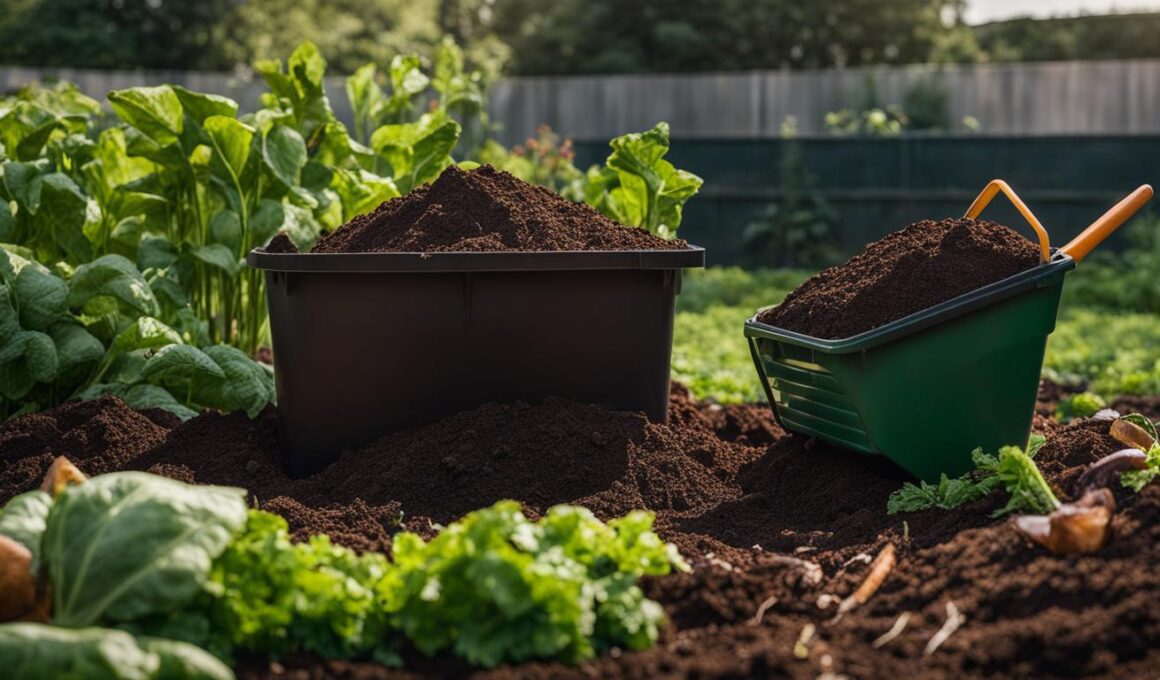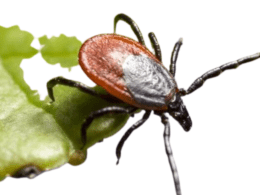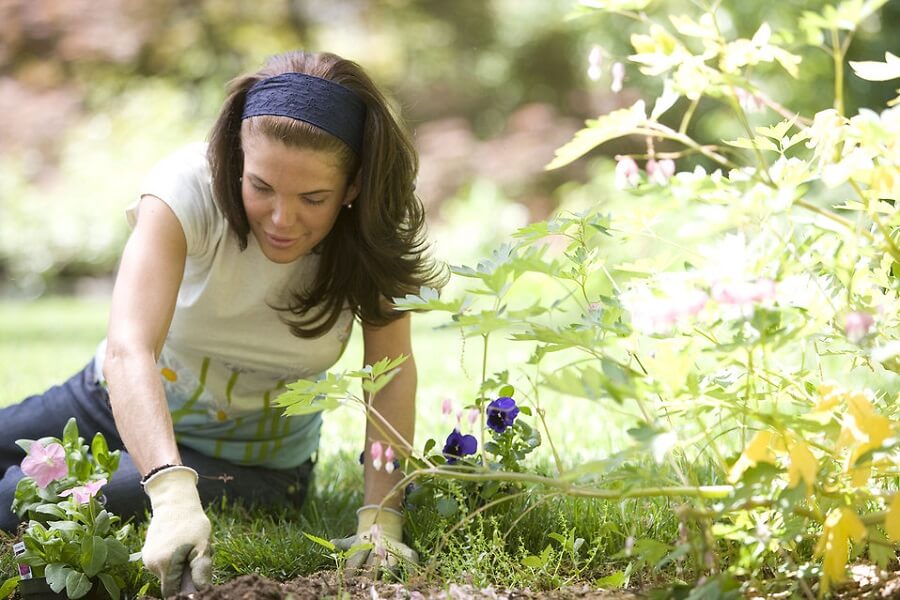Compost is an essential component for maintaining a healthy and productive vegetable garden. When choosing the best compost for your vegetable garden, there are several factors to consider.
It should be rich in organic matter, dark brown or black in color, and have a smooth, crumbly texture. The compost should also hold moisture well and have a neutral, earthy smell. The best compost for a vegetable garden should have a nutrient density that matches the needs of the plants you are growing. This can be achieved by using a variety of organic materials in the composting process, such as clover, coffee grounds, fruit scraps, and vegetable scraps. Avoid adding materials like ashes, dairy, meat, and oils, as they can negatively impact the quality of the compost.
Post Summary:- Choose compost that is rich in organic matter, dark brown or black in color, and has a smooth, crumbly texture.
- Select compost with a neutral, earthy smell and good moisture retention.
- Ensure the compost has a nutrient density that matches the needs of your vegetable plants.
- Use a variety of organic materials in the composting process, such as clover, coffee grounds, fruit scraps, and vegetable scraps.
- Avoid adding materials like ashes, dairy, meat, and oils to maintain compost quality.
What Makes the Best Compost for a Vegetable Garden?
The best compost for a vegetable garden consists of a carefully balanced mix of organic materials. These ingredients provide essential nutrients to nourish your plants and promote healthy growth. Organic compost materials include clover, coffee grounds, fruit scraps, vegetable scraps, and more. These components contribute to the nutrient density of the compost, ensuring that it meets the specific needs of your vegetable garden.
The compost should have a dark brown or black color, indicating that it has decomposed properly and contains rich organic matter. A smooth consistency and a neutral, earthy smell are also indicative of high-quality compost. To maintain the ideal nutrient density, it’s important to mix in a variety of organic materials during the composting process.
Furthermore, the pH level of the compost is crucial for its effectiveness. The best compost for a vegetable garden should have a pH level near neutral, around 6-7. This pH range ensures that the compost won’t be too acidic or alkaline, providing an optimal environment for plant growth. Regularly testing the pH level of your compost can help you monitor and adjust it if necessary.
What Makes the Best Compost for a Vegetable Garden?
| Compost Components | Benefits |
|---|---|
| Clover, coffee grounds, fruit scraps, vegetable scraps, etc. | Contributes to nutrient density and provides essential nutrients for plant growth. |
| Dark brown or black color, smooth consistency, neutral smell | Indicates proper decomposition and high-quality organic matter. |
| pH level near neutral (around 6-7) | Creates an optimal environment for plant growth by preventing acidity or alkalinity. |
“The best compost for a vegetable garden should have a pH level near neutral, around 6-7.”
By incorporating these compost ingredients and considering the important factors mentioned, you can create the best compost for your vegetable garden. Providing your plants with nutrient-rich soil will help them thrive and yield a bountiful harvest.
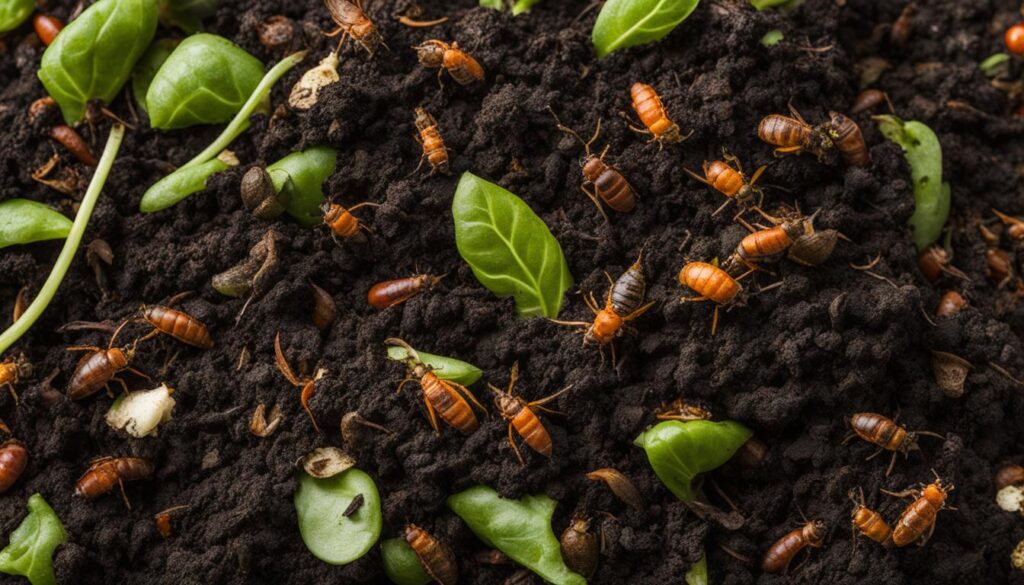
The 4 Best Bagged Compost Products for Vegetable Gardens
If you don’t have the time or space to make your own compost, there are some great bagged compost products available on the market. These organic compost products are specially designed to provide the necessary nutrients and organic matter for your vegetable garden, ensuring healthy plant growth and high yields. Here are the top 4 bagged compost products to consider:
1. Blue Ribbon Organics OMRI Certified Natural Premium Organic Compost
This compost is made from recycled materials and meets the standards for use in organic production. It is rich in essential nutrients and organic matter, providing a well-balanced diet for your vegetable plants. The compost is carefully processed to ensure a consistent quality and nutrient density, making it a reliable choice for any vegetable garden.
2. Wakefield BioChar Organic Premium Compost
With its high content of active fungi and bacteria, this compost is formulated to promote healthy soil and plant growth. The addition of biochar helps improve soil structure and water retention, while the organic matter provides essential nutrients. This premium compost is perfect for vegetable gardens that need a boost in soil fertility.
3. Black Kow Organic Mushroom Compost
Derived from composted soil used for growing mushrooms, this unique product is packed with organic matter and beneficial microbes. It enriches the soil with essential nutrients and improves its water-holding capacity, creating a favorable environment for vegetable plants to thrive. The compost has a dark, rich color and a pleasant earthy smell.
4. Dr. Earth Organic Compost
This compost is rich in earthworm castings and a variety of organic nutrients, making it an excellent choice for vegetable gardens. It provides a balanced diet for your plants, ensuring they receive the essential nutrients they need to grow strong and healthy. The compost is carefully formulated to enhance soil fertility and promote vigorous plant growth.
| Product | Key Features |
|---|---|
| Blue Ribbon Organics OMRI Certified Natural Premium Organic Compost | Made from recycled materials, meets organic production standards, rich in essential nutrients and organic matter |
| Wakefield BioChar Organic Premium Compost | High content of active fungi and bacteria, improves soil structure and water retention |
| Black Kow Organic Mushroom Compost | Derived from composted soil used for growing mushrooms, rich in organic matter and beneficial microbes |
| Dr. Earth Organic Compost | Rich in earthworm castings and organic nutrients, enhances soil fertility and promotes vigorous plant growth |
These bagged compost products offer a convenient and reliable solution for vegetable gardens, providing the necessary nutrients and organic matter for optimal plant growth. Choose the one that suits your garden’s needs and watch your vegetables thrive!
How to Make Your Own Compost for a Vegetable Garden
Making your own compost for a vegetable garden is a rewarding and sustainable practice. By following a few simple steps, you can create nutrient-rich compost that will benefit your plants. Here is a guide to help you get started.
Gather Your Compost Ingredients
The first step in making your own compost is to gather the necessary ingredients. Aim for a mix of green and brown materials to achieve a balanced compost pile. Green materials include grass clippings, vegetable scraps, and coffee grounds, while brown materials include dried leaves, straw, and wood chips. Avoid adding materials such as meat, dairy products, and oils, as they can attract pests and slow down the composting process.
Build Your Compost Pile or Bin
Next, choose a location for your compost pile or bin. It should be easily accessible and well-drained. If you’re using a compost bin, make sure it has proper ventilation to allow for oxygen circulation. Begin by layering your green and brown materials, making sure to add water to keep the compost moist. The ideal moisture level is similar to that of a damp sponge. Regularly turn the compost pile to aerate it and speed up the decomposition process.
Monitor and Maintain Your Compost
As your compost pile decomposes, it will go through different stages. Initially, it may heat up and develop an earthy smell, indicating that the decomposition process is active. Over time, the pile will cool down and turn into a dark, crumbly material that resembles soil. This is a sign that your compost is ready to be used in your vegetable garden. Use a compost thermometer to monitor the temperature of your pile, aiming for a range of 110-160°F (43-71°C) to ensure proper decomposition.
| Green Materials | Brown Materials |
|---|---|
| Grass clippings | Dried leaves |
| Vegetable scraps | Straw |
| Coffee grounds | Wood chips |
Remember to regularly turn your compost pile and keep it moist by watering it as needed. This will help speed up the decomposition process and ensure that your compost is ready in a timely manner.
Composting is a natural process that allows organic materials to break down and transform into valuable soil amendments. By making your own compost, you can reduce waste, improve soil fertility, and promote sustainable gardening practices. Plus, it’s a great way to save money and create a healthier environment for your vegetable garden.
Why is Compost Good for a Vegetable Garden?
Compost offers numerous benefits to your vegetable garden, making it an essential ingredient for healthy and thriving plants. Here are some of the key advantages of using compost:
- Nutrient Enrichment: Compost is rich in essential nutrients like nitrogen, phosphorus, and potassium, which are vital for plant growth. These nutrients are slowly released into the soil, providing a steady and balanced supply to your vegetable plants.
- Improved Soil Structure: Incorporating compost into your garden helps improve soil structure by increasing its water-holding capacity and reducing soil erosion. It also enhances soil aeration, allowing plant roots to access oxygen more easily.
- Disease Suppression: Compost fosters a diverse and healthy soil ecosystem, which can help suppress plant diseases and pests. It supports the growth of beneficial microorganisms that compete with harmful pathogens, reducing the risk of plant infections.
In addition to these benefits, compost also enhances the soil’s ability to retain moisture, reduces the need for synthetic fertilizers, and promotes the growth of beneficial earthworms. By incorporating compost into your vegetable garden, you are creating a nutrient-rich and well-structured environment that supports the optimal growth and yield of your plants.
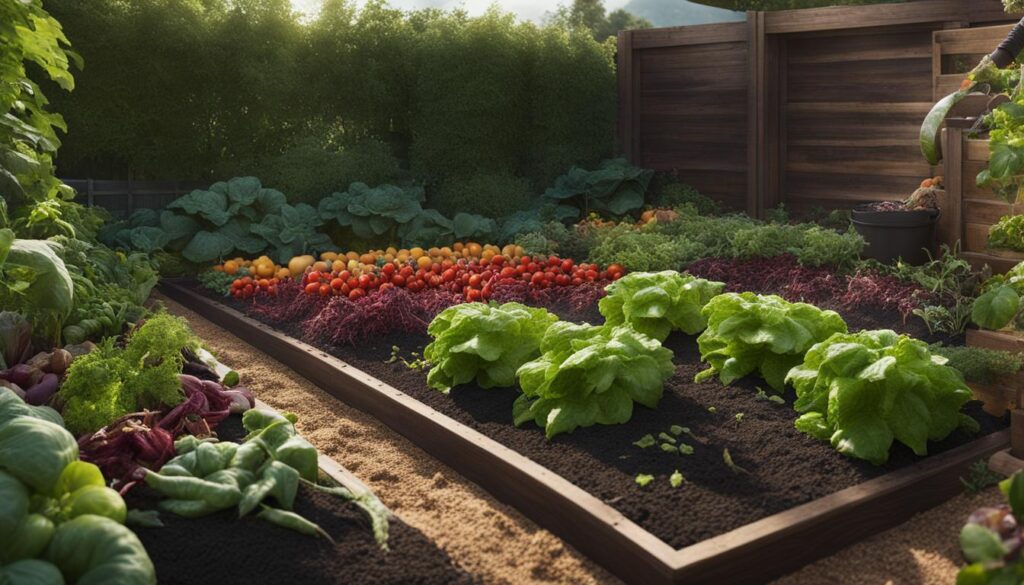
Compost is the natural way to nurture your vegetable garden, ensuring that your plants receive the essential nutrients they need to thrive. With its nutrient enrichment, improved soil structure, and disease-suppressing properties, compost is a valuable resource for any gardener. By utilizing compost in your vegetable garden, you are taking a sustainable approach to cultivation and creating a healthy growing environment for your plants.
Why is it Important to Avoid Using Peat Moss?
When it comes to choosing the best compost for your vegetable garden, it’s crucial to avoid using peat moss due to its negative environmental impact. Peat moss is harvested from peat bogs, which are important carbon sinks and home to various species of plants and animals. The extraction of peat moss contributes to the destruction of these fragile habitats and releases carbon into the atmosphere, exacerbating the issue of climate change.
Furthermore, peat moss is naturally acidic, and adding it to your garden soil can make it more acidic as well. This increased acidity can negatively affect the pH balance of the soil, leading to nutrient deficiencies in your plants. Additionally, the use of peat moss in compost can contribute to soil compaction, reducing its ability to hold water and air. This can hinder root growth and overall plant health in your vegetable garden.
“The extraction of peat moss contributes to the destruction of fragile habitats and releases carbon into the atmosphere, exacerbating the issue of climate change.”
The Environmental Impact of Peat Moss
Harvesting peat moss involves draining the wetlands and stripping away the vegetation that helps maintain the delicate balance of the ecosystem. This disruption of the natural habitat can have detrimental consequences for wildlife that depend on these bogs for survival. Additionally, the carbon stored in peat bogs is released into the atmosphere when they are drained, contributing to greenhouse gas emissions and global warming.
- Benefits to Avoiding Peat Moss:
- Preserves fragile ecosystems
- Reduces carbon emissions
- Maintains a healthy soil pH
- Prevents soil compaction
| Environmental Impact | Soil pH | Soil Compaction |
|---|---|---|
| Contributes to habitat destruction | Increases soil acidity | Reduces water and air circulation |
| Releases carbon into the atmosphere | Causes nutrient deficiencies | Impedes root growth |
Can Coffee Grounds from Vole Prevention be Used in Vegetable Garden Compost?
Keeping voles away with coffee grounds can be an effective method for vole prevention in vegetable gardens. It is believed that the strong aroma of coffee grounds can deter voles, helping to protect your plants. Additionally, coffee grounds can be used in compost to improve soil quality, making them a great double-purpose solution for gardeners.
Conclusion
Choosing the best compost for your vegetable garden is essential for promoting healthy plant growth and maximizing your harvest. By selecting a compost that is rich in organic matter and has a balanced nutrient density, you can provide your plants with the optimal conditions for thriving.
Whether you decide to make your own compost or purchase bagged compost, it’s important to consider the specific needs of your vegetable garden. Organic matter is a key factor in compost, as it helps improve soil structure and provides essential nutrients for plant growth.
Understanding the composting process and the ingredients that contribute to nutrient density can help you make an informed decision. By using a variety of organic materials, such as clover, coffee grounds, fruit scraps, and vegetable scraps, you can create a compost that meets the specific requirements of your vegetable garden.
With the right compost, you can enhance the overall health of your soil, promote beneficial microorganisms, and ultimately enjoy a thriving and bountiful vegetable garden. So, whether you choose to make your own compost or purchase a trusted bagged product, prioritize the well-being of your plants by providing them with the best compost possible.
What is the Best Type of Compost to Use in a Raised Garden Bed?
When deciding on the appropriate compost amount raised garden bed, it’s important to consider the specific needs of your plants. For most raised garden beds, a mix of organic compost and soil is ideal for providing nutrients and promoting healthy growth. Experiment with different ratios to find the best mix for your garden.
FAQ
What should I look for when choosing compost for my vegetable garden?
When choosing compost for your vegetable garden, look for compost that is rich in organic matter, has a dark brown or black color, has a smooth, crumbly texture, holds moisture well, and has a neutral, earthy smell.
What materials should I use to make my own compost for a vegetable garden?
To make your own compost for a vegetable garden, use a mix of green and brown materials such as grass clippings, leaves, vegetable scraps, and straw.
Can I use bagged compost for my vegetable garden?
Yes, there are some great bagged compost products available on the market that are suitable for vegetable gardens. Some popular options include Blue Ribbon Organics OMRI Certified Natural Premium Organic Compost, Wakefield BioChar Organic Premium Compost, Black Kow Organic Mushroom Compost, and Dr. Earth Organic Compost.
What are the benefits of using compost in a vegetable garden?
Compost enriches the soil with essential nutrients, improves soil structure, helps suppress plant diseases and pests, and promotes the growth of beneficial microorganisms, all of which contribute to healthier plants and a more productive harvest.
Why should I avoid using peat moss in my vegetable garden?
Using peat moss in a vegetable garden should be avoided because it has a negative environmental impact, contributes to soil acidity, and can lead to soil compaction.





